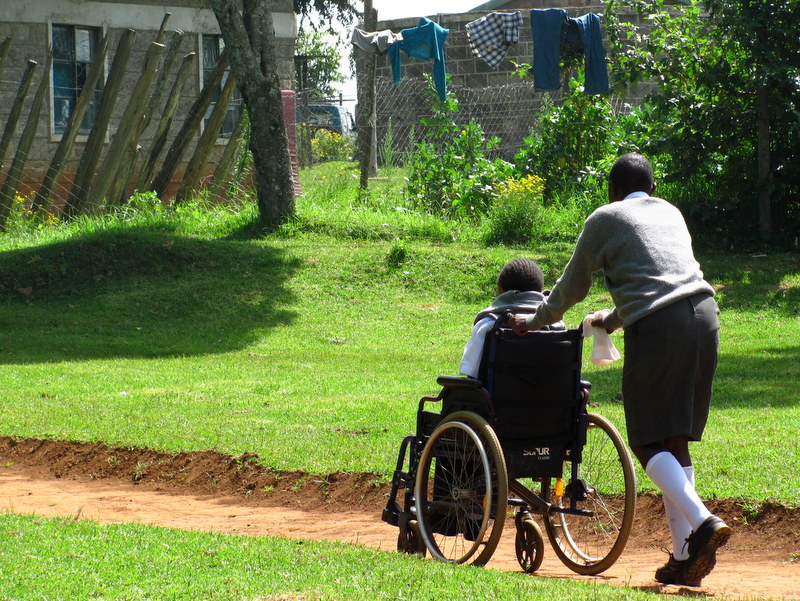PERSONS WITH DISABILITIES STILL FACE CHALLENGES IN KENYA DESPITE LAW
Despite the policies, regulations and constitutional provisions protecting persons living with disabilities, they still remain among the marginalised lot in Kenya.
The persons with disabilities in Kenya hardly access any specialised support services in urban and rural areas. Instead they depend in third parties for support. However, the helpers are mostly ignorant of their plight and are sometimes unavailable.
In the major cities in Kenya such as Nairobi, Mombasa and Kisumu, the disabled do not enjoy the right to access the public spaces as most of the facilities are yet to comply with the legislation. The Kenyan Constitution binds all construction works to include ramps for physically challenged persons to easily access the facilities.
Usually, people with disabilities are confined to the wheel chair, mostly a result of various medical conditions such as polio. Those born with disability often find it difficult to use the available transport systems both in the rural and urban areas in Kenya. This is because the systems have not been developed to suit their needs, and they often face discrimination when it comes to using matatus, a popular form of public transport in Kenya.
There have been reported cases where persons living with disabilities have been mistreated by matatu touts, a practice which is widespread in the sector, especially in the cities. As such, there has been public outcry from persons living with disabilities over harassment by touts and other matatu stakeholders who infringe on their right to access and use of public facilities as stipulated in the law.
This state of affairs has forced the majority of the persons with disabilities to be left behind in the social, economic and political participation in the country. Their productivity levels have been greatly hindered and this proves burdensome to the country’s economic progress in the long run.
According to Nyanza regional chair for persons living with disabilities, Mr George Odhiambo, Persons with Disabilities Act No.14 of 2003 provides for the realisation of the rights of persons living with disabilities and equal opportunities. “Its high time matatu touts stopped harassing persons living with disability because anyone can be disabled any time,” he states.
Mr Odhiambo adds that his office has received several cases of harassment and crude behaviour by matatu touts who often abuse and insult most of the disabled people.
Mr Odhiambo also noted that the law gives the disabled persons the right to use the available transport systems in the country, therefore the public should be tolerant towards persons living with disabilities and assist them in every area.
“In most cases matatus would refuse to stop to pick a person living with a disability and instead just drive off past them or even just refuse to assist them to board the matatu saying that they have no space for the wheel chairs and no time to wait,” he explains.
Article 54 of the Constitution of Kenya provides that a person with any disability is entitled to be treated with dignity and respect and to be addressed in a manner that is not demeaning.
It furthers states that one is entitled to reasonable access to all places, public transport and information.
Even though the Kenyan government has since fulfilled its mandate on representation of persons with disability with five per cent in public positions, the right to access to use of State facilities has not been met, leaving many disabled persons vulnerable in the society.
The government still has the responsibility to take steps towards the full realisation of the rights of persons with disabilities as set out in the Persons with Disability Act 2003.
The matatu sector is, however, yet to comply with the existing policies as established under Section 23 of Persons with Disability Act 2003 which imposes an obligation upon public service vehicle providers to adapt them to suit persons with disabilities.
Stakeholders in the matatu sector should thus develop policies and regulations that cut across the board, on whether a person is disabled or not.
According to the Kenyan laws, the state should promote and protect human rights. Therefore, the State and non-state actors including the society should start looking after persons living with disabilities, ensuring that their rights are promoted and protected as provided for in the law.
The National Council for Persons with Disabilities (NCPWD) which is a State institution formed under Persons with Disability Act 2003 under the Ministry of Labour Social Security and Services, is also mandated to promote the rights of persons with disabilities in Kenya and mainstream disability issues into all aspects of national development.



I wish to know more about plwd in Kenya because i have a passion of changing their lives for the better. I’m a social worker and a member of county assembly in Nakuru county where through legislation which is one of my key responsibility i have a platform to bring positive dynamic towards the lives of the PLWD’s.
i wish to get the benefits and acess to the rights of persons living with disability am spina bifida type
Wish to get challenges faced by the handicapped in games and sports